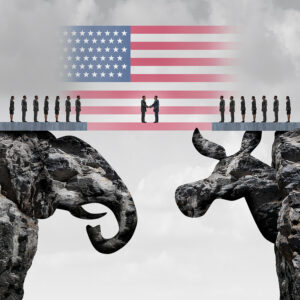Editor’s Note: For another viewpoint, see Point: The Freedom to Vote is Nonpartisan.
Active social media users are likely to assure you that bipartisanship is dead — and for good reason. These platforms have ensured that the most extreme partisans have the biggest megaphones. Politicians trying to curry their favor very often don’t just argue that their opponents are wrong on any given issue, but that they are inherently bad.
Yet when it comes to many actual public policy questions, there is far more bipartisan agreement than indicated by your Twitter feed.
Americans on both sides of the aisle have long wanted workers who need paid time off from work to have better options. The question has always been how to do so, without undermining existing paid leave benefits, adding big tax burdens, reducing people’s take-home pay, or eliminating flexible work options and opportunities, particularly for women. A bipartisan paid leave proposal sheds light on a potential answer: Sens. Bill Cassidy and Kyrsten Sinema introduced legislation to allow new parents the option of taking a $5,000 advance on their child tax credit to fund paid leave at the time of their child’s birth or adoption. Importantly, this benefit would be voluntary, wouldn’t require new taxes or spending, and wouldn’t discourage companies from offering paid leave benefits. It would go a long way to providing targeted relief for those who need it and would make the safety net better, rather than just bigger.
Both Republicans and Democrats also want policies that encourage the use of clean energy and improve the environment, but without tanking the economy and needlessly driving up energy prices. At the end of last year, a bipartisan vote in Congress passed and President Donald Trump signed the Energy Act of 2020, which encouraged American innovation and the development of new technologies that will combat climate change while also growing our economy as well. This — not radical measures like the Green New Deal — is the approach most Americans want.
Education is another area of potential bipartisan agreement. In the wake of COVID, there is growing recognition that parents need and deserve more leverage over schools — and that’s not just true for conservatives. According to recent polling by RMG Research, 54 percent of independents and 41 percent of Democrats — and 59 percent of Black Democrats — believe parents have too little control. A full 77 percent of parents believe that if a school fails to offer in-person learning, parents should be free to enroll their child at another school at no cost. Sixty-two percent believe that should also apply to parents unhappy with their schools’ mask policies.
We should be able to make progress on these issues — to increase parental choice in education, pursue smart and environmentally-friendly energy policies, and provide targeted, fiscally responsible support to workers who need it — but today’s media environment discourages people from coming together on these issues. Traditionally non-partisan, mainstream media sources, in particular, have shifted left and too often join the chorus of progressive activists in labeling anyone outside of the progressive caucus not just wrong, but evil. Why should anyone moderate work with the other side when that other side has been written off as unworthy of consideration?
This hasn’t just stymied conservatives, but liberals too. Rather than advancing their policy agenda, Congressional leaders have been held hostage by radicals who think that $3.5 trillion is too modest a spending bill to pass. Americans disagree. Fifty-two percent of respondents in a recent Gallup poll today believed that, “government is doing too many things that should be left to individuals and businesses.” The bipartisan divide on that question was great, with 80 percent of Republicans agreeing that government was overreaching, compared to just 18 percent of Democrats. But 57 percent of Independents — up from 38 percent last year — shared the conservative view.
Given this skepticism of government, it’s no wonder that a recent AFP/YouGov poll found that more Americans oppose the administration’s $3.5 trillion spending bill than support it. The mainstream media would never encourage the left to recognize their own role in this overreach. They define bipartisanship as conservatives caving to whatever progressives want. But that’s simply not how most Americans see it. Indeed, bipartisanship still exists, just not among today’s power brokers in Washington — nor in the media that covers them.

